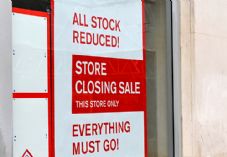UK DIY News
PwC: Consumers To Rein In Festive Spending

The cost-of-living crisis will cause consumers to rein in their planned spending on presents and celebrations over the festive period
Expected average of £393 per person festive spend is £33 less than last year or £1.8 billion less overall than 2021
The average spending of every demographic group is expected to decline - even to below pre-pandemic levels for those over the age of 45
For those spending less this year, 57% say it is because their personal finances have been hit and 54% say they have less money to spend
Net spending intention for every category of festive spending is expected to decline, with Christmas dinner and food and drink remaining the priority
PwC’s annual Festive Predictions report published today, paints a challenging picture for retailers and hospitality operators in the critical run-up to Christmas, as consumers say they will rein in their spending on gifts and celebrations this year.
Following last minute cancellations of parties and family gatherings, as a result of the Omicron variant last year, many had hoped for a return to normality in 2022. Retailers have been hoping for a continuation of the strong momentum from Black Friday, which saw increased shopper interest, particularly amongst under 35 year olds, and an estimated £0.5 billion in additional spending according to PwC’s research last month
However, consumers are instead planning to reduce their festive spending, with an average spend of £393 per adult - that’s 8% less than last year’s £426, and 4% less than the £412 spent before the pandemic in 2019. Shoppers of all age groups say they will spend less, with the biggest decline amongst 45-54 year olds, who expect to spend 10% less than in 2021 and 20% less than before the pandemic. Overall, 22% of shoppers plan to spend less in 2022, and only 9% think they’ll spend more.
Amongst those spending less this year, the top reasons cited were because their personal finances have been hit (57%), because they have less money to spend (54%) and because they are less confident about their finances (47%), reflecting the findings of PwC’s latest Consumer Sentiment survey.
Kien Tan, Retail Director at PwC comments:
“After two years’ of challenging trading due to pandemic lockdowns, tier restrictions and the Omicron variant curtailing festivities, the high street had been hoping for a bounceback this Christmas. But, with the cost-of-living crisis beginning to bite consumers, and overall spending forecast to decline by 8% this year as a result, retailers will instead need to help their customers economise, while keeping Christmas special. At the same time, they will also be trying to attract the one in ten consumers who actually intend to spend more in 2022.”
Christmas dinner - and food and drink more generally - remain the key spending priorities, with almost as many people saying they will spend more as spend less. But, with record food price inflation, this still suggests that many Christmas dinner tables will see less lavish feasts than in previous years. This also reflects the fact that fewer of us (66%) expect to be spending Christmas attending - or hosting - an extended family gathering than in a typical year before the pandemic (71%). In fact, with 2022 being the first Christmas without widespread travel restrictions in three years, 11% of Britons hope to be on holiday, or visiting family abroad this year - almost twice as many as in a normal year (6%).
Across all other spending categories, the survey found that between a quarter and a third expected to spend less, with higher priority placed on gifts for children and pets than on other categories. There have been notable declines in priority on fashion and Christmas stocking fillers and treats, suggesting that ‘practical gifting’ will take precedence over frivolous spending in more frugal times.
It won’t all be bad news for the high street. While the pandemic accelerated the shift to online shopping for Christmas presents, as with Black Friday, there’s been a recovery in the preference for shopping in physical stores. Including click & collect, 45% of gift shopping will be done in person - exactly the same as before the pandemic in 2019.
Interestingly, despite claiming they will be shopping earlier than usual - in order to bag bargains such as in the Black Friday sales - more than half of consumers will actually wait until December to do most of their Christmas shopping. This figure is higher than any of the last five years. Only one in four shoppers stated they would do most of their Christmas gift shopping during the Black Friday period, rising to two in five amongst 25-34 year olds. As usual, men expect to be less organised than women, with almost twice as many men (8%) saying they would leave most of their shopping until the week before Christmas.
Lisa Hooker, PwC’s Consumer Markets Leader comments:
“With earnings barely keeping up with record inflation on utilities and groceries, it’s no surprise that consumers are telling us they plan to spend less this Christmas. And the fact that spending intentions are negative across every category means that no corner of the high street will be spared. However, with 2022 being the first completely restriction-free Christmas since before the pandemic, can retailers convince shoppers to part with more of their cash when they get to the till, particularly as inflation means they will be getting less for their money? And, if so, could that lead to a credit card hangover as bills need to be paid in the New Year?”
Source : PwC
Thank you for the excellent presentation that you gave at Woodbury Park on Thursday morning. It was very interesting and thought-provoking for our Retail members. The feedback has been excellent.











































